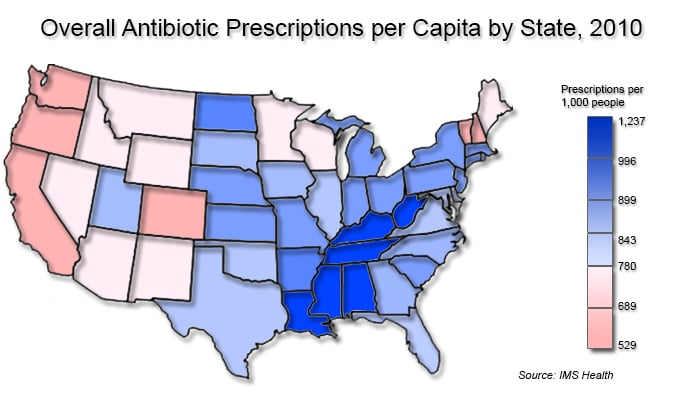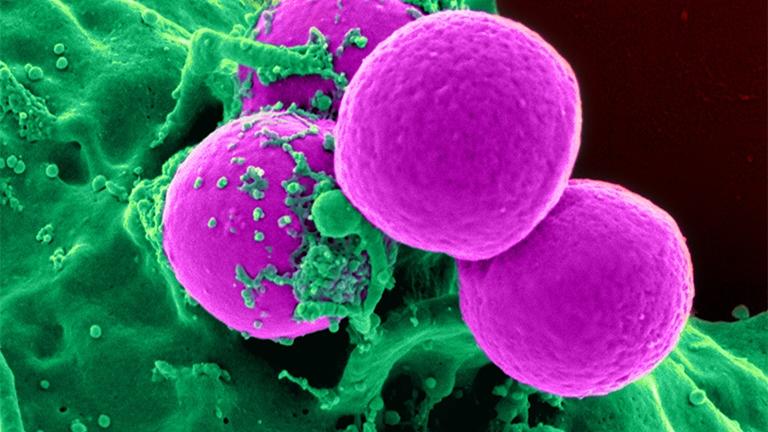Are hospitals over-prescribing antibiotics to their patients? A recent report by the Center for Disease Control and Prevention states that some clinicians prescribe three times as many antibiotics than clinicians in other hospitals, which can sometimes result in a patient taking an antibiotic for too long, potentially causing super-resistant infections.
Joining us to discuss the effects of overdosing on antibiotics and how hospitals can improve antibiotic-prescribing are Dr. Emily Landon, Assistant Professor of Medicine at The University of Chicago, and Dr. John Flaherty, Professor in Medicine-Infectious Diseases at Northwestern Medicine.
View a graphic of antibiotic prescriptions in the U.S. by state in 2010.

Read an interview with Dr. Emily Landon:
 What does the antibiotic stewardship program encompass?
What does the antibiotic stewardship program encompass?
We improve the use of antibiotics in our hospital. We control the antibiotics on our restricted list. When doctors are prescribing an antibiotic, they have to call and get approval in order to use the drug. After a patient has been using an antibiotic for 48-72 hours, we check in and see if they still need to be taking it. We also do a lot in terms of safety; we adjust dosage, transition a patient to pill form, monitor and report antibiotic usage. With our infectious control program, we oversee preventing transition of infections, like making sure patients are in precautions, making sure equipment and doctors are being handled properly.
When a patient leaves, we do a supervised super clean, where a supervisor has to watch the room being cleaned making sure it’s ready for the next patient. Our program has reduced the use of these drugs by almost 60 percent in the past three years, and with our infectious disease control program, we were able to reduce the number of infections by 40 percent. Those are the sort of things that need to be done in every hospital, and I know some hospitals have seen an increase in numbers.
What puts an antibiotic on the restricted list?
It may be an antibiotic that is only to be used as a last resort, only if we absolutely need to use it depending on what’s wrong with the patient. Sometimes they are really, really expensive, and it wouldn’t be in the best interest of the hospital or the patient to charge what would need to be charged. There may also be bad side effects to an antibiotic that would require more intensive monitoring, or it may be an anti-fungal drug. Mainly, because the drug is last resort, too expensive or potentially unsafe.
For what reasons are antibiotics usually prescribed?
In a hospital, usually for serious infections. A patient may have a poor immune system and can’t fight off infection, and they need aggressive treatment; lung or urinary tract infection, skin infections. If a person is very sick from infections and patients who are typically in the intensive care unit. Someone can’t keep up with breathing or is having blood pressure issues, intra-abdominal issues.
In outpatient care, they may be prescribed a Z-Pak for a cold or wounds or ear infections. Most people know or have heard of these types of antibiotics. Times where a doctor could prescribe an antibiotic or choose another method of treatment. So, at times, antibiotics are prescribed anyway because it’s better than having something dangerous happen to the patient. It’s very different in hospitals than in outpatient.
What is considered too long of a time length for someone to be taking an antibiotic?
Research is still being conducted on the length of time that’s appropriate or dangerous for certain antibiotics, but it’s really hard to say and it depends on the infection. We used to treat community pneumonia for 14 days. After research, we realized that it can be done in 4-5 days. However, if someone still isn’t better after that time period, then we would move them back to two weeks. The answer is a lot more complicated than we thought, but it really depends on who they are and what they have.
What are some of the other negative effects of antibiotics?
They can cause allergies. They can also change your microbiome. Every person is covered in a film of bacteria; they are good bacteria. When you take an antibiotic, you kill that bacteria and sometimes you can clear all of it off. It could also possibly cause weight gain, and there’s research being done with mice to see how this works, and if that is a factor in the country’s obesity problem.
Interview has been condensed and edited
~Graphic by Taurean Small






